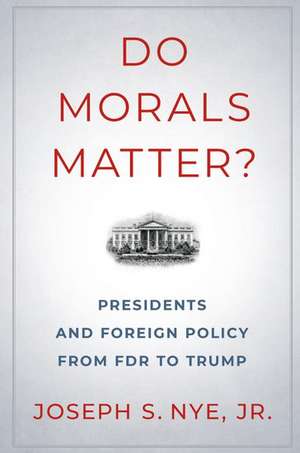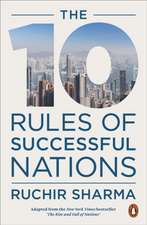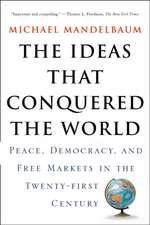Do Morals Matter?: Presidents and Foreign Policy from FDR to Trump
Autor Joseph S. Nyeen Limba Engleză Paperback – 13 ian 2022
| Toate formatele și edițiile | Preț | Express |
|---|---|---|
| Paperback (1) | 95.30 lei 10-16 zile | +33.62 lei 4-10 zile |
| Oxford University Press – 13 ian 2022 | 95.30 lei 10-16 zile | +33.62 lei 4-10 zile |
| Hardback (1) | 125.80 lei 10-16 zile | +46.18 lei 4-10 zile |
| Oxford University Press – 23 mar 2020 | 125.80 lei 10-16 zile | +46.18 lei 4-10 zile |
Preț: 95.30 lei
Preț vechi: 113.98 lei
-16% Nou
Puncte Express: 143
Preț estimativ în valută:
18.24€ • 18.97$ • 15.06£
18.24€ • 18.97$ • 15.06£
Carte disponibilă
Livrare economică 13-19 martie
Livrare express 07-13 martie pentru 43.61 lei
Preluare comenzi: 021 569.72.76
Specificații
ISBN-13: 9780197586297
ISBN-10: 0197586295
Pagini: 272
Dimensiuni: 231 x 152 x 23 mm
Greutate: 0.36 kg
Editura: Oxford University Press
Colecția OUP USA
Locul publicării:New York, United States
ISBN-10: 0197586295
Pagini: 272
Dimensiuni: 231 x 152 x 23 mm
Greutate: 0.36 kg
Editura: Oxford University Press
Colecția OUP USA
Locul publicării:New York, United States
Recenzii
...highly recommended...
Analysing the ethics of US foreign policy under each presidential administration since 1945, Nye scores the policies of each presidency according to their intentions, the means they used and their consequences. He examines each president's leadership qualities and considers how US foreign policy might best address contemporary challenges such as great-power competi-tion and climate change.
In times like these, it is important to appreciate the role that moral reasoning should play in foreign policy. This is especially true in a democracy, where sustaining global involvement requires support from citizens. Joe Nye is one of our foremost and engaging analysts of American diplomacy, and in this book he provides a clear-eyed guide for reengaging our moral compass.
From the doyen of US foreign policy thinkers, a powerful warning against domestic populist politics, which not only narrow our moral vision but defeat US purposes around the world.
With characteristic insight and precision, Joseph Nye raises tough questions of how much ethics should shape a nation's foreign policy, provides a sweeping review of how past presidents have embraced or rejected ethical imperatives, and constructs a helpful scorecard for judging future presidents. This book takes on even greater significance as a growing number of nations-led by the U.S.-nakedly put self interest first.
In Do Morals Matter? Joseph S. Nye argues persuasively that in foreign policy, good intentions must be accompanied by the use of appropriate means that generate beneficial consequences. His astute analysis of American presidents since World War II demonstrates that 'contextual intelligence' is crucial for moral principles to yield good results.
A lucid, thoughtful and original examination of the role morality plays as American presidents shape their foreign policy. As Professor Nye shows convincingly in this highly readable book, leaders and citizens alike make assumptions, decisions and judgments which reflect their own views about what is good and bad. Yet again he has contributed much to our better understanding of international relations.
Analysing the ethics of US foreign policy under each presidential administration since 1945, Nye scores the policies of each presidency according to their intentions, the means they used and their consequences. He examines each president's leadership qualities and considers how US foreign policy might best address contemporary challenges such as great-power competi-tion and climate change.
In times like these, it is important to appreciate the role that moral reasoning should play in foreign policy. This is especially true in a democracy, where sustaining global involvement requires support from citizens. Joe Nye is one of our foremost and engaging analysts of American diplomacy, and in this book he provides a clear-eyed guide for reengaging our moral compass.
From the doyen of US foreign policy thinkers, a powerful warning against domestic populist politics, which not only narrow our moral vision but defeat US purposes around the world.
With characteristic insight and precision, Joseph Nye raises tough questions of how much ethics should shape a nation's foreign policy, provides a sweeping review of how past presidents have embraced or rejected ethical imperatives, and constructs a helpful scorecard for judging future presidents. This book takes on even greater significance as a growing number of nations-led by the U.S.-nakedly put self interest first.
In Do Morals Matter? Joseph S. Nye argues persuasively that in foreign policy, good intentions must be accompanied by the use of appropriate means that generate beneficial consequences. His astute analysis of American presidents since World War II demonstrates that 'contextual intelligence' is crucial for moral principles to yield good results.
A lucid, thoughtful and original examination of the role morality plays as American presidents shape their foreign policy. As Professor Nye shows convincingly in this highly readable book, leaders and citizens alike make assumptions, decisions and judgments which reflect their own views about what is good and bad. Yet again he has contributed much to our better understanding of international relations.
Notă biografică
Joseph S. Nye, Jr. is University Distinguished Service Professor Emeritus and former Dean of Harvard's Kennedy School of Government. He received his bachelor's degree summa cum laude from Princeton University, won a Rhodes Scholarship to Oxford, and earned a Ph.D. in political science from Harvard. He has served as Assistant Secretary of Defense for International Security Affairs, Chair of the National Intelligence Council, and a Deputy Under Secretary of State. His most recent books include The Powers to Lead, The Future of Power, Presidential Leadership and the Creation of the American Era, and The Power Game: a Washington Novel. He is a fellow of the American Academy of Arts and Sciences, the British Academy, and the American Academy of Diplomacy. In a recent survey of international relations scholars, he was ranked as the most influential scholar on American foreign policy, and in 2011, Foreign Policy named him one of the top 100 Global Thinkers.





















